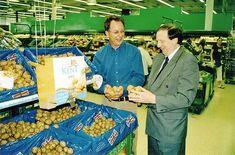
Kent Veg member growers, supplying Tesco through category manager Branston, attended the seasonal launch at the 80,000sqft Tesco Express at Broadstairs, where they were able to see the county brand on the packs in-store.
The oasthouse logo now appears on packs and loose displays of potatoes in some 35 stores across the county.
“It is very encouraging for our growers to get this degree of support,” says SNCF’s managing director Nick Tapp. “We are determined to rise to the challenge and ensure that the quality and quantity exceed Tesco’s expectations.”
Roy Maynard, Tesco’s senior potato buying manager confirmed that a strong local identity has helped increase sales, and revealed that other Kent produce such as apples and cauliflower would also being carrying a similar identity later in the year.
LINCS BENEFIT FROM HOME COUNTY DEMAND
While Lincolnshire might not have the obvious cross-country recognition enjoyed by Jersey or Cornish varieties, its local potatoes are extremely sought after in its close surroundings, according to Colin Jackson, md of Paul Jackson Potatoes (PJP).
“We perhaps have a little way to go. But where Cornwall promotes itself on being the earliest, we are a little bit later, although perhaps we are a bit better in terms of quality, particularly in terms of frying capabilities,” says Jackson. Given the high demand for chipping potatoes in the Midlands, these characteristics are important to his customers, he explains.
Having survived 50 years in the potato business, PJP currently supplies small retailers, wholesale markets and processors, as well as some export markets with a variety of its regional potatoes. Jackson says that Lincolnshire potatoes are not sought after by the supermarkets to the extent of other regional varieties. However, other options are available and well worthwhile for businesses such as PJP, says Jackson. Around 25 per cent of Jackson’s crop is sold to greengrocers, while the remaining three quarters are absorbed by food processors for frying. “We do supply some packers but we don’t supply any of the retailers directly,” he says. “Some people do very well out of it and others do very badly. I think we have an easier life by not doing it.”
Having observed the most important change in the market in recent years, Jackson has begun developing a food service company, providing potatoes, as well as meat to local businesses. As such, he has taken the concept of locality to the next level by offering a broader level of service to his nearby customers. “A major thing we have got to consider is how the chip shop market is going to develop,” Jackson explains. “They used to just buy 25kg sacks and endless amounts of starch would be washed down the drain. But now the changes in legislation mean they’ve got to have settling tanks, so a lot of customers are wanting ready-made part-fried or ready-cooked chips, so that is a market we are seriously looking at.”
Jackson says with suppliers battling against a fairly stagnant market, there has never been a better time to think in terms of reinvention. “We started the foodservice side of the business up to be ahead of the game. We are set up to accommodate our local customers and we feel that in he long-term this is the direction we are going to take. There will always be a market for potatoes, but perhaps in a different guise to what it has been in the last 50 years, and it will be a case of survival of the fittest and we have to be ready for it.”



